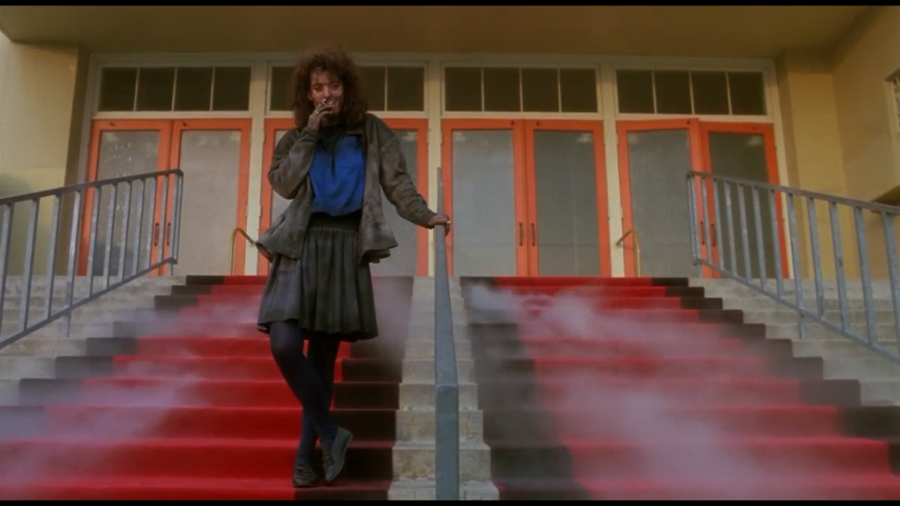The brilliance of “Heathers” (no, not the play)
Released in 1988, “Heathers” encompasses one of the best American documentations of satirical commentary in the wild hair era. Following other cult classics such as “Beetlejuice”, “Clue” and “The Rocky Horror Picture Show”, “Heathers” stands out in its legacy for becoming one of the most introspective on teenage life and the convoluted politics surrounding it. Unfortunately, as popular as the rock opera of the film became, the musical still fails to emphasize the same cynical tone that made it so captivating in the first place.
April 17, 2023
Cult classics: a favorite genre for the masses. Whether one finds themself captivated by the intriguing life of the director, by the unique style of screenwriting, or simply a need within themself to live as an individual; several reasons exist as to why one might do anything for the movie category. The Internet showcases a plethora of top ten lists of cult classic films, and practically for every single one, director Micheal Lehman’s 1989 “Heathers” shows up on the ranking. A —even now—raunchy film, it manages to congregate dozens of hard-hitting topics in a monolith of a movie. A film, unfortunately, greatly overshadowed by its rock musical adaptation.
“Dark, seditious, wicked, devious, hilarious— all of these words could be used to [describe] ‘Heathers,’ one of the best, most cynical black comedies out there,” reviewer Sara Cartland said.
Superfans Kevin Murphy and Laurence O’Keefe—a screenwriter and composer duo respectively—decided to bring the movie to new audiences with the renaissance of new musicals back in 2010. Following the 2010s, Broadway fans continuously sought out dark and black comedies. Murphy and O’Keefe saw this demand and decided to use it to their advantage, bringing eyes onto an amazing work produced so long ago. Therefore, “Heathers” premiered and was associated with other acts such as “The Book of Mormon” and “Dear Evan Hansen”.
A multitude of similarities exists between the movie and the musical, with the general plot serving as one. Westerburg High, a school ruled by the iron fists of the Heathers Duke, McNamara and Chandler and proxy woman and protagonist Veronica Sawyer. Not like the other girls, Veronica’s a sarcastic intellectual with a deep-rooted sense of right and wrong and an allure for danger. This attracts her to the new bad boy in town, JD: a trenchcoat-wearing, keen smirk-having and angsty boy who seems to rival Veronica in smarts, but, throughout the course of the plotline, showcases his deeply troubled mindset. The romance between the two causes head honcho Heather Chandler to try to kick Veronica out of the group. One mix-up with a blue hangover cure and car coolant later, and Veronica and JD double down on their crime with the latter of the two wanting massive goals for Westerburg High.
But, between the murders and iconic one-liners later, the gaps between the movie and the musical widen the size of the craters. The film hammers in on its crass and deeply cynical analysis of the ridiculousness of small-town politics, while the musical, melodramatic in nature, wears the meaning on its sleeve. The final throwdown scene between —spoilers— JD and Veronica serve as a physical representation of just how different the two iterations become from one another, with the film using dull colors, tight, choppy wordplay and a disinterested Veronica smoking a cigarette as the former love of her life becomes nothing more than ashes in the sand greatly contrasts the colorful, dynamic display of the musical.
While certain people appreciate the musical for that distinct reason, others can argue that making the bleakness a show breaks down the reason why “Heathers” became so groundbreaking in the first place. The movie tackles suicide, queerness in homophobic spaces and bulimia all with tongue-in-cheek commentary; enough to make one laugh before thinking about how that absurdity integrates itself into nearly every American alive right now. O’Keefe and Murphy did not need to make a display of Duke’s suicide attempt or JD’s extreme depression and codependency when the film did just fine on its own. Veronica used her blunt yet sincere voice to talk Duke out of it, and JD’s continuous lies—especially when about a gun’s origins that they used to do in the name of love and honor—do the job itself.
“It feels extremely relevant in our day-to-day lives, even over 30 years after it was released. Big movies now can’t even make good movies about suicide and other teen issues without it feeling forced and fake—looking at you ‘13 Reasons Why’. That’s what makes [Heathers] so refreshing; it’s more than just ‘wow so sad’, they truly cared about making it a satire with criticism embedded like a game of Operation,” magnet senior Madison Oakley said.







